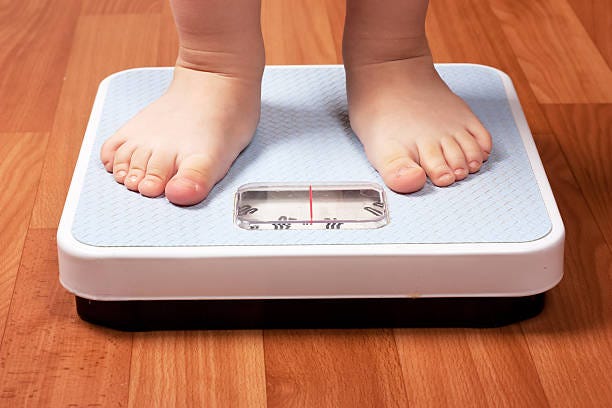Copyright substack

Every week, research papers pile up in my inbox like unopened letters from the future. As a psychologist working primarily with children and young people, I sift through them hunting for insights that might help the kids on my caseload to navigate toward healthier, more resilient lives. Sometimes what I discover changes everything I thought I knew about helping people heal. The statistics arrive with predictable brutality. A recent study in JAMA Network Open delivered another stark reminder of what we're facing: childhood obesity climbed steadily from 2008 to 2023, while severe pediatric obesity exploded by 253%. But for those of us working in mental health, these numbers tell a deeper story. Behind every statistic sits a young person wrestling not just with physical health, but with shame, anxiety, depression, and a fractured relationship with their own body. In my office, I see how these struggles intertwine. The seventeen-year-old who won't eat lunch at school because she's afraid of judgment. The 12-year-old whose anxiety spikes every time he has to change clothes for physical education with the other boys. The young adult who's internalized years of medical appointments focused solely on weight loss, leaving her convinced that her worth as a person depends entirely on a number on a scale. Yet hope lives in unexpected corners of research. A systematic review from China spanning 17 years confirmed something many of us working with young people have observed: exercise works, but not always in the ways we expect. Moderate-to-high intensity training for more than 50 minutes, three times per week, effectively improved weight and cardiovascular risk factors. More importantly for my work, the young people who engaged in regular physical activity reported better mood regulation, improved sleep, and greater confidence in social situations. But the psychological benefits often emerge before any physical changes become visible. I've watched anxious teenagers discover that a twenty-minute walk can quiet the racing thoughts that keep them awake at night. I've seen depressed young adults find that strength training offers them a sense of agency and control when everything else feels chaotic and overwhelming. From Denmark came another piece of the puzzle that resonates deeply with what I observe in practice. Each additional hour of screen time increased metabolic risk in children and adolescents, but sleep duration moderated that risk. Kids who slept better could weather the metabolic storm of excessive screen time. As someone who regularly helps young people untangle their relationship with technology, this finding illuminates something crucial: it's not just about the screens themselves, but about how screen use disrupts the fundamental rhythms that support both physical and psychological well-being. The young people I work with often describe their phones as both lifeline and prison. Social media connects them to friends and communities, but it also delivers a constant stream of comparison and judgment. Late-night scrolling provides comfort and distraction from difficult emotions, but it steals the restorative sleep their developing brains desperately need. Understanding these complexities helps us move beyond simple prescriptions like "just put the phone down" toward more nuanced strategies that honor both their needs and their realities. So where do we aim our therapeutic efforts? Should we focus on helping young people establish healthier boundaries with technology? Should we prioritize sleep hygiene and hope that better rest cascades into improved mood and decision-making? Should we address the underlying anxiety and depression that often drive both overeating and under-sleeping? The research on socioeconomic factors adds another layer of complexity. Numerous studies have found associations between family income and pediatric well-being, but the relationship isn't straightforward. Poverty creates stress that affects everything from cortisol levels to food choices to access to mental healthcare. Yet I've also worked with affluent teenagers whose anxiety about academic performance drives them toward disordered eating patterns, and whose families' emphasis on achievement leaves little room for the messy work of emotional development. For years, I've carried a particular conviction about the young people who come to me struggling with weight, body image, and related mental health challenges. Physical activity, I believed, could serve as a powerful intervention. Not just for weight management, but for mood regulation, anxiety reduction, and building the kind of embodied confidence that helps young people navigate social pressures with greater resilience. This belief felt both evidence-based and intuitive. I'd seen too many young people discover that running could quiet their anxious minds, that yoga could help them reconnect with bodies they'd learned to hate, that team sports could provide the social connection and sense of belonging that had been missing from their lives. Movement seemed like natural, accessible medicine natural, free from the side effects that concerned many families about psychiatric medications. Researchers tracked 4,200 adults across 34 countries and cultures, measuring daily calorie burn in populations whose activity levels differed dramatically. The results were stunning and counterintuitive: people burned similar numbers of calories regardless of whether they lived active or sedentary lifestyles, whether their communities had high or low obesity rates. The implications rippled through everything I thought I understood about the relationship between movement and weight. Physical activity (one of my go-to recommendations for young people struggling with both physical and mental health) couldn't account for population-level differences in obesity rates. If movement wasn't the primary factor in weight management, then diet had to be playing a much larger role than many of us realized. A National Public Radio headline captured the research perfectly: As I absorbed these findings, I found myself reflecting on the young people in my practice and the complex relationships they have with food. The student who restricts all day and then binges at night. The teenager whose family diet consists primarily of processed foods, not from choice but from the realities of working multiple jobs and food desert geography. The young person whose emotional eating intensified during the isolation of the pandemic and hasn't returned to previous patterns. This is just one study, of course. Science builds understanding slowly, through accumulation of evidence rather than single revelations. But this research feels like it illuminated something important that many of us working in mental health have been sensing: the solutions to our current crisis of physical and psychological well-being in young people may be more complex than we've been acknowledging. We've struggled just as much to help young people develop healthier relationships with food as we have to increase their physical activity levels. If reducing obesity-related health risks is part of our goal, these findings suggest we need to redirect significant energy toward understanding and addressing eating patterns. But as mental health professionals, we know that sustainable changes in eating behavior require us to address the emotional, social, and psychological factors that drive those patterns. The teenager who eats when anxious needs anxiety management tools, not just nutrition education. The young adult who restricts food as a way of exerting control needs to develop other sources of agency and self-efficacy. The college student whose social life revolves around late-night pizza orders needs help building connections that don't center on food. Whether we can summon the social and political will to address the broader food environment that shapes young people's choices (e.g., the marketing of processed foods, the economics of healthy eating, the cultural messages about bodies and worth) remains an open question. Does this mean I'll stop recommending physical activity to the young people I work with? Absolutely not. But I'm becoming more intentional about why and how I make these recommendations. Even before encountering this research, I'd begun questioning the direct relationship between exercise and weight loss in my clinical observations. What I consistently witnessed was something different and perhaps more profound. The primary gift of physical activity for young people isn't weight management. It's psychological resilience. Movement offers something our digitally-native, academically-pressured, socially-anxious young people desperately need: a way to discharge stress, regulate emotions, and reconnect with their bodies as sources of strength rather than shame. These benefits matter regardless of what the scale says, and often emerge long before any physical changes become visible. I think of Maya, a sixteen-year-old who started running not to lose weight but to quiet the panic attacks that had been disrupting her sleep. Within weeks, she reported feeling calmer and more confident, though her weight remained unchanged. Or David, whose depression began lifting when he joined his a local cricket team, not because cricket burned calories but because it connected him with peers who shared his interests and gave him concrete goals he could achieve. The mental health benefits of physical activity are well-documented and robust. Regular exercise reduces symptoms of anxiety and depression, improves sleep quality, enhances cognitive function, and builds self-efficacy. For adolescents and young adults, whose brains are still developing crucial regulatory systems, these effects can be particularly powerful. But here's what the research on calorie expenditure helps us understand: we need to be honest with young people about what physical activity can and cannot do. Promising them that exercise will solve their weight concerns may set them up for disappointment and self-blame when the pounds don't disappear as expected. Instead, we can help them discover the immediate, tangible benefits that movement offers for mood, energy, sleep, and stress management. This shift in focus opens up new possibilities for therapeutic intervention. Rather than prescribing exercise as a weight-loss strategy, we can explore with young people what kinds of movement bring them joy, connection, and a sense of competence. We can help them tune into how their bodies feel before, during, and after different activities, developing interoceptive awareness that supports both physical and emotional well-being. Sometimes the most important discoveries aren't about finding new treatment protocols, but about asking better questions and holding space for complexity. Instead of focusing solely on changing bodies, maybe we need to ask: What does it mean for a young person to have a healthy relationship with their body? How do we help them develop the psychological tools they need to navigate a culture that profits from their insecurity? The research will keep coming, one study at a time. But perhaps the real work lies not just in interpreting the data, but in remembering that every young person who walks into our offices is more than their symptoms, more than their weight, more than any single aspect of their health. They are whole human beings deserving of care that honors their complexity, their potential, and their inherent worth, regardless of what any scale or study might suggest. In this work, as in all meaningful healing, the path forward requires both scientific rigor and profound compassion. The numbers matter, but so do the stories behind them. Our job is to hold both with equal care.



